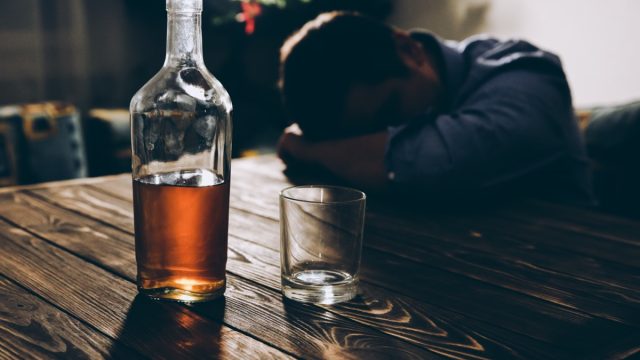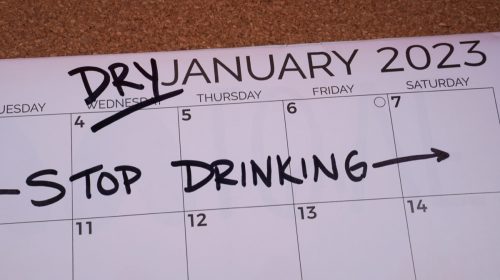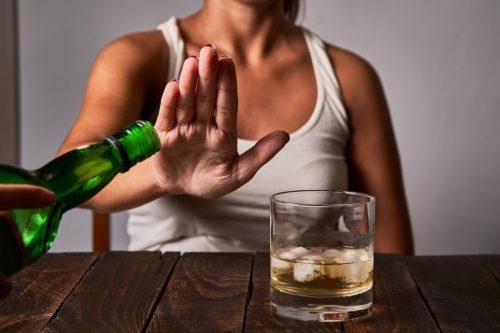Some Doctors Are Discouraging People From Doing “Dry January”—Here’s Why

Whether a frosty pilsner or dirty martini is your drink of choice, alcohol consumption tends to increase during the holidays. But after all the boozy parties and wine-fueled dinners slow down, many people are looking for a reset. This is where Dry January comes into play. At the beginning of the new year, taking a month off of drinking is a way many people detox after all the holiday revelry and become more mindful of their alcohol consumption for the rest of the year.
But while Dry January is normally viewed as a healthy decision, it’s becoming a cause of concern for some doctors. Read on to discover why.
READ THIS NEXT: Brad Pitt Credits This Huge Star With Helping Him Overcome Addiction.
1
The benefits of participating in Dry January.

Giving up booze for any amount of time should never be discouraged. Alcohol is a toxin after all, and can cause various health problems from liver disease to diabetes.
“Reducing instances of harmful drinking—even if you can’t cut alcohol out altogether—has tangible medical benefits,” says John Mendelson, chief medical officer at Ria Health. “For example, we see better kidney function, reduced blood pressure, and improvement in liver enzymes just by reducing the amount of alcohol consumed.”
Another benefit, despite the obvious physical perks, is gaining a better outlook on your relationship with alcohol. Choosing to have less of it in your life will help you become more aware of how much alcohol you’re consuming and why.
“Probably the biggest benefit is the self-awareness it forces you to confront,” says Mendelson. “It offers a chance to take stock of your drinking consumption and habits. It’s a great time to really have a heart to heart with yourself and decide: Has my drinking escalated to a point where it’s impacting work, relationships, and other areas of my life?”
Dry January can also inspire someone to reflect on their patterns with alcohol and create healthy long-term changes.
“Someone might use that month to find new ways to socialize or they may find they enjoy spending money on things other than alcohol,” says Amy Morin, a psychotherapist and editor-in-chief of Verywell Mind. “If they struggle to quit, it may help them see that alcohol has a bigger impact on them than they thought, which may inspire them to create long-term changes.”
2
The success rate of Dry January is low.

Choosing to participate in Dry January doesn’t automatically mean you’ll succeed. In fact, studies have shown that success rates are relatively low for individuals trying to stay sober the whole month.
“Data from over 15,000 users found that 35 percent of those aiming for a sober month had a drink the first week,” says Mendelson. “The first Friday was also the most common ‘first fail’ day, and Fridays in general had nearly twice as many drinkers as any other day of the week.”
Ultimately, you may need to set a goal for yourself that’s not all or nothing. Practicing moderation with alcohol may be easier than saying no for an entire month.
“People often fail in the first week of Dry January because they set unrealistic expectations and goals,” says Flora Sadri-Azarbayejani, DO, MPH, FAAFP, FASAM of Psyclarity Health. “While it is important to have a goal in mind, it should be realistic and achievable. For example, if you are used to drinking every day, then quitting cold turkey may not be the best approach. Instead, it would be better to start by reducing the amount and frequency of drinking, such as having two non-alcoholic days in a week.”
3
Dry January can be potentially dangerous.

Dry January can actually be quite dangerous for heavy drinkers as withdrawing from alcohol can be deadly.
“It’s dangerous for people who drink regularly to quit drinking cold turkey,” says Morin. “Many doctors don’t recommend people stop drinking all at once. Some people are able to taper their alcohol intake under the supervision of a doctor while other people may need to go to a detox hospital.”
While most people won’t have significant withdrawal symptoms that are serious, many people will at least feel uncomfortable when stopping all at once.
“Abruptly quitting alcohol could lead to withdrawal symptoms such as anxiety, sleep problems, tremors, depression, nausea, headaches, and fatigue,” says Sadri-Azarbayejani.
It’s essential to consult with your doctor before you make any drastic changes to your lifestyle.
3
Dry January is not for those with serious drinking issues.

If you are struggling with alcohol consumption or addiction, taking a month off won’t necessarily help you become sober. “Everyone’s situation is different and what works for one person may not work for another,” says Sadri-Azarbayejani. Ultimately, everyone has a different relationship with alcohol, so it’s best to consult with a doctor and figure out a plan together.
“If you really have a problem, Dry January isn’t going to be your solution,” says Mendelson. “In fact, there’s been a concerted shift in the medical community toward harm reduction in addition to abstinence. Physicians and medical experts are beginning to recommend methods to moderate and reduce episodes of harmful drinking rather than attempting to abstain from it altogether.”
He also notes that there are medications that can help those trying to quit drinking. “Medications like Naltrexone, used in combination with therapy and behavioral modifications, reduces motivation to drink by blocking the reinforcement or ‘reward’ from alcohol in the brain.”
READ THIS NEXT: If This Happens When You Drink Alcohol, It Might Be Time to Stop.
4
It’s important to plan Dry January out.

If a Dry January seems right for you this year, it’s important to come up with a strategy if you want to be successful, especially if you’re going to be around other people who are drinking.
“Make sure that you have a plan for how you will cope with cravings or any temptations during Dry January,” says Sadri-Azarbayejani. “Otherwise, you may find yourself reaching for a bottle when faced with cravings or temptation. For instance, distraction techniques such as calling a friend, going for a walk, or doing some exercise can help take your mind off the craving.”